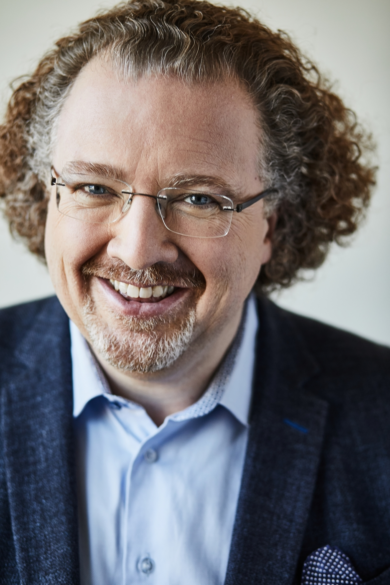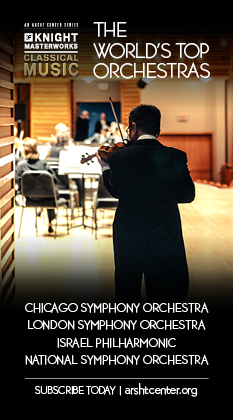Denève eager to set sail at helm of New World Symphony

Stephane Deneve will open his first season as artistic director of the New World Symphony Saturday night.
Stephane Denève believes concerts are “a transcendent experience that can only happen live.”
Speaking via Zoom from St. Louis (where he is music director of the St. Louis Symphony), the new artistic director of the New World Symphony sees the Miami Beach-based orchestral academy at the forefront of creating a multi-disciplinary world that can include actors, dancers and video, mixing artistic genres.
Denève’s future plans envision a new paradigm that will include opera and large scale choral-vocal works in addition to the symphonic repertoire that has dominated the organization’s thirty-five year history.
Rarely played works from outside the standard orchestral literature and music of the present day are among the conductor’s priorities to enrich the experience of New World fellows and audiences alike. The programming for Denève’s first season at the ensemble’s helm reflects these artistic paths, mixing the familiar with adventurous new offerings.
On Saturday night, Denève opens the season with “a homage to blue,” musically paying tribute to Miami’s blue skies, seas, glasses, chairs and the New World’s Blue Project (which encourages players to develop entrepreneurial skills and create their own community outreach events). American composer Adolphus Hailstork’s American Port of Call will open the evening, followed by Ibert’s Escales (Ports of Call) which Denève calls “colorful, virtuosic and exotic.” The Sea Interludes from Benjamin Britten’s Peter Grimes precede Debussy’s La Mer, “the most famous blue music ever,” according to the conductor. The Debussy will be accompanied by minimalistic visuals designed by New World’s videographer Clyde Scott which Denève emphasizes will be nonintrusive.
October 14-15 will bring Visions of Cahokia (also with a video component) by James Lee III, Peter Lieberson’s Neruda Songs with mezzo-soprano Kelley O’Connor and the conductor’s own suite from Prokofiev’s Romeo and Juliet. The program is evidence of Denève’s goal to allow new voices to be heard. He considers the 2005 Lieberson song cycle to be a masterwork.
Continuing the partnership begun last season with the Cleveland Orchestra, Denève will conduct the opening concerts of the Clevelanders’ 2023-2024 Miami residency at the Arsht Center on November 17-18 with members of the New World Symphony joining for a side-by-side performance of Richard Strauss’ massive Alpine Symphony. He will field an ensemble of 143 musicians for what promises to be a unique event. Denève views the score as “maybe the most incredible, well orchestrated work by Strauss, which is both “a monumental piece and a monumental journey in everyway” through a day in the Alps and a voyage to a mountain’s summit.
Opening the new year, Denève leads two French rarities with Ravel’s Shehérazade (featuring star mezzo Isabel Leonard) as centerpiece January 20 and 21, 2024. Albert Roussel’s ballet score The Spider’s Feast opens the concert which concludes with Florent Schmitt’s tone poem The Tragedy of Salomé. The conductor has long championed and recorded much of Roussel’s music and he views the Schmitt score as “supremely beautiful…closest to a Strauss tone poem mixed with Debussy style impressionism.”
The New World season concludes May 11-12 with a concert in which three contemporary works will share the bill of fare with Stravinsky’s The Rite of Spring which the conductor deems “forever new and so unique.” A commissioned score by French composer Guillaume Connesson (whose works Denève has previously led here) will receive its premiere. Scored for the same instrumental forces as Stravinsky’s iconic opus, the conductor related that it may be different in aura and texture, spanning summer to winter. Two pieces by John Williams, who Denève greatly admires, complete the season’s valedictory concert – Just Down the Street…on the left and Violin Concerto No. 1 with James Ehnes as soloist. (Ehnes and Denève have recently recorded the Williams concerto.)
The conductor’s wide ranging first season programming reflects his enthusiasm and commitment for contemporary music which has been evident in his St. Louis programming. John Adams, Anna Clyne, Jennifer Higdon, Kevin Puts, James Lee 1I1, Carlos Simon, Jessie Montgomery, James MacMillan, Magnus Linberg, Esa=Pekka Salonen and Connesson are among the 21st century composers he expresses enthusiasm for. “I believe there is a lot of great music to be written still.”
__________
Denève decided to become a conductor when he was fourteen years old, after having led some student groups in the north of France. Eventual studies at the Paris Conservatoire and a position as pianist with the Orchestre de Paris would lead to his coming in contact with conductors who influenced and inspired his artistry. He credits Georg Solti for his “infinite love of music,” Seiji Ozawa for the beauty and fluidity of his podium gestures, and Carlo Maria Giulini, who he said “inspired me tremendously and made me believe in miracles.” The conductor regards his piano teacher Andre Dumortier as his “Yoda” who taught him music more than piano as well as poetry and philosophy, instilling in him the spirit that there was always something g to learn.
In 2005, Denúve became music director of the Royal Scottish National Orchestra, his first appointed position. He has since been chief conductor of the Stuttgart Radio Symphony, music director of the Brussels Philharmonic and principal guest conductor of the Philadelphia Orchestra (with which he gave a superb Shakespeare themed tour concert in Miami in 2016). LINK Currently, in addition to his St. Louis and New World directorships, he is principal guest conductor of the Netherlands Radio Philharmonic.
Denève says he is humbled by the legacy of the New World’s co-founder and artistic director laureate Michael Tilson Thomas and intends to continue his focus on the singing quality of music. As an opera conductor, he strives to “create a narrative to make a score come alive and find meaning and life inside the music.”
He does not adhere to a literal fidelity to a score without interpretive embellishment nor wide ranging interpretive embellishments that see the published scores only as a blueprint. Deneve relates that he strives to “respect what is written but bring life to the moment with enthusiasm and passion.”
Indeed, his numerous previous performances with NWS have been marked by textual clarity, careful balancing of instrumental choirs and timbres and a wonderful sense of spontaneity. At his debut concert as artistic director in April, he led a revelatory traversal of Richard Strauss’ tone poem Ein Heldenleben. Rarely have the ensemble’s strings resounded with such tonal richness and Deneve never allowed momentum or intensity of expression to ebb or lose cohesion. Rather than emerging diffuse as is often the case), this Heldenleben was, by turns, heroic, romantic and bereft of overblown bombast.
At a time of cutbacks in funding and length of orchestral seasons and concerns about audiences returning after the Covid pandemic, Denève remains optimistic. He regards the refined balance and quest for perfection unique in what a symphonic ensemble can achieve as unique and views orchestras as an acoustic phenomenon that is an antidote to the modern world.
Considering music making on the highest level as “good for the soul,” Denève foresees a big future for orchestras. Considering the New World Symphony as a laboratory that allows fellows accessibility to online masterclasses and innovative orchestral and chamber music programming, he believes the organization is poised to prepare talented young players for that future. “I believe the New World Symphony is a life changer that will prepare and help young musicians become inspiring artists.”
With his podium command, high artistic standards, charisma and vision, South Florida audiences have much to look forward to.
Stephane Denève conducts the New World Symphony in Ibert’s Escales (Ports of Call), Britten’s Four Sea Interludes from Peter Grimes and Debussy’s La Mer. Conducting fellow Molly Turner leads Adolphus Hailstork’s An American Port of Call 7:30 p.m. September 16 at the New World Center in Miami Beach. The concert is sold out.
Denève conducts Mozart’s Serenade No. 10 for wins (Gran Partita) on a chamber music program with works by Enescu and Olly Wilson. 2 p.m. October 8 at the New World Center.
Denève conducts James Lee II’s Visions of Cahokia, Prokofiev’s suite from Romeo and Juliet and Peter Lieberson’s Neruda Songs with mezzo-soprano Kelley O’Connor. 7;30 P.M. October 14 and 2 p.m. October 15 at the New World Center. nws.edu
Posted in Articles
Leave a Comment
Wed Sep 13, 2023
at 3:30 pm
No Comments



